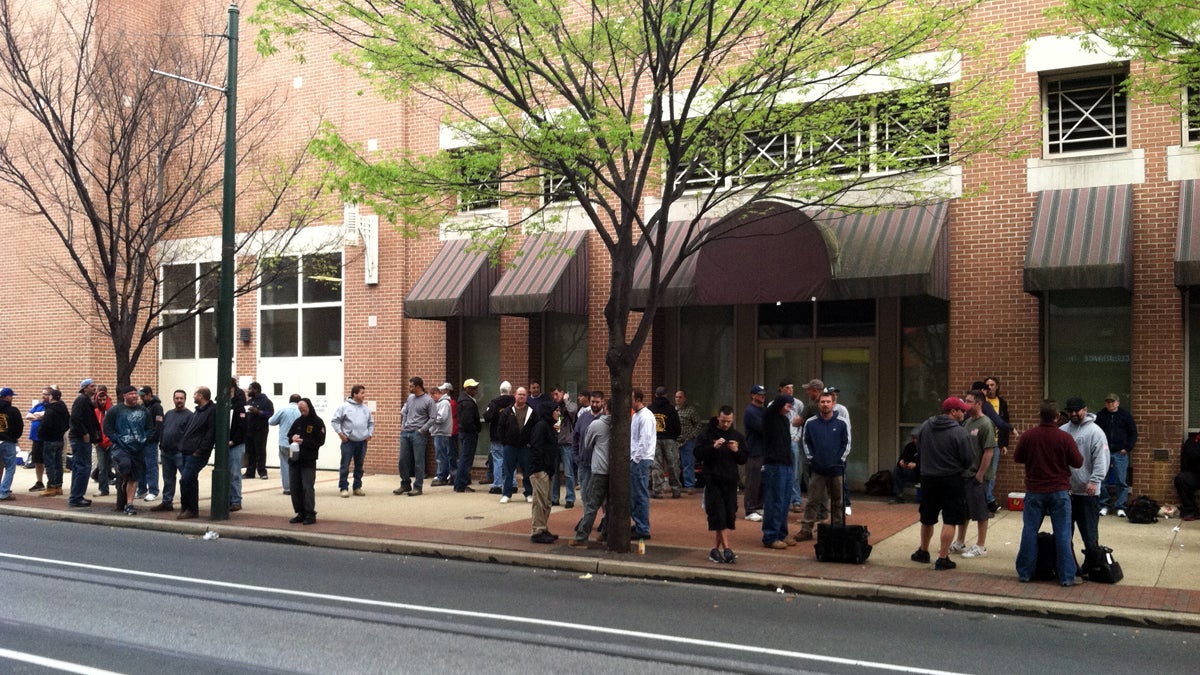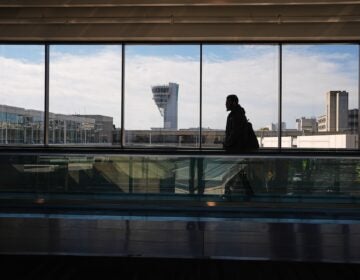One year later, carpenters and Convention Center still at odds
Listen
Members of the Carpenters Union protest outside the Pennsylvania Convention Center in May, 2014 (NewsWorks file photo)
It’s been one year since carpenters union members lost access to jobs at the Pennsylvania Convention Center after missing a key deadline to agree to new work rules.
But a decision by the Pennsylvania Labor Relations Board to review the case means the ongoing dispute about the Metropolitan Regional Council of Carpenters’ future means the issue will linger through the summer and into the fall, when hearings on the dispute will likely begin.
Convention Center officials are unhappy with the board’s decision to review the case, but they’re confident that they’ll prevail in the end. They marked Wednesday’s anniversary by highlighting what one called the “great year” that has followed the adoption of their new work rules and the departure of the carpenters (along with the Teamsters, who also missed last May’s deadline).
Meanwhile, representatives for the carpenters union denied any wrongdoing and vowed to get their members back on the job before another year passes.
“This dispute is over a disputed deadline,” said Martin O’Rourke, a spokesman for the union. “The carpenters have agreed to all the new work rules, they have agreed to everything. They look forward to going back to work at the Convention Center … and doing the great job they’ve always done.”
The dispute over work rules and the carpenters’ conduct in the center has been bitter, and goes back years. The primary issue was the requirement that union carpenters assemble exhibitors’ booths, which critics have said adds unnecessary costs and time, as well as discouraging customers.
Convention Center director John McNichol said the change in the atmosphere has been dramatic since the work rules were changed, the carpenters left, and members of the local stagehands union assumed most of their duties.
“There’s really a new culture here. It’s much more cooperative, much more customer-centric,” McNichol said, “We’re saving time, we’ve saving money and energy, we’ve taken all the old legacy issues of being hassle-ridden out of the equation.”
A complicated squabble
The dispute has been complex from the start, with representatives of the carpenters and Teamsters suggesting that the underlying motive was to shift jobs to rival unions. Pennsylvania labor officials initially ruled that the carpenters had no case, but reversed their decision without explanation late last month.
State labor officials can’t say exactly when they’ll hear the carpenters’ grievance, but expect it to be sometime next fall.
McNichol called their decision to hear the case after initially rejecting it “puzzling” but expects to prevail in the end.
Failing to do so, he said, would come at a cost: Customers, he said, will leave if the carpenters come back.
“In all the discussions we’ve had with our customers, they’ve made it abundantly clear that if we go backwards, if the CSA [Customer Satisfaction Agreement] is rewritten and the work rules contained in it change in any meaningful way, that not only would they consider not coming back, but in some cases they’ve told us that they won’t come back,” McNichol said.
O’Rourke passionately disputes the notion that the carpenters union is any more responsible for the Convention Center’s various business woes than any other union. He says the carpenters are fully prepared to abide by any new work rules.
“The Convention Center is in this big PR spin mode — they’re going to say anything,” he said. McNichol’s claim that the center has scheduled 28 national conventions over the next five years since the carpenters departure is, O’Rourke said, “highly questionable.”
“It’s just bad for business,” to keep the carpenters protesting on the street when they should be working inside, O’Rourke said. “The carpenters believe that people should be reasonable … evidently the Convention Center is not being reasonable, but they believe reasonable heads will prevail.”
Meanwhile, union carpenters including Tom McGuinness will continue picketing the Convention Center, protesting daily from their spot across from the Reading Terminal Market while they wait for their day in court.
“I liked working in the center,” said McGuinness. “You go in, you never know when you’re getting out. Guys make a lot of money here. And now they don’t make anything because we’re not in there.”
WHYY is your source for fact-based, in-depth journalism and information. As a nonprofit organization, we rely on financial support from readers like you. Please give today.




